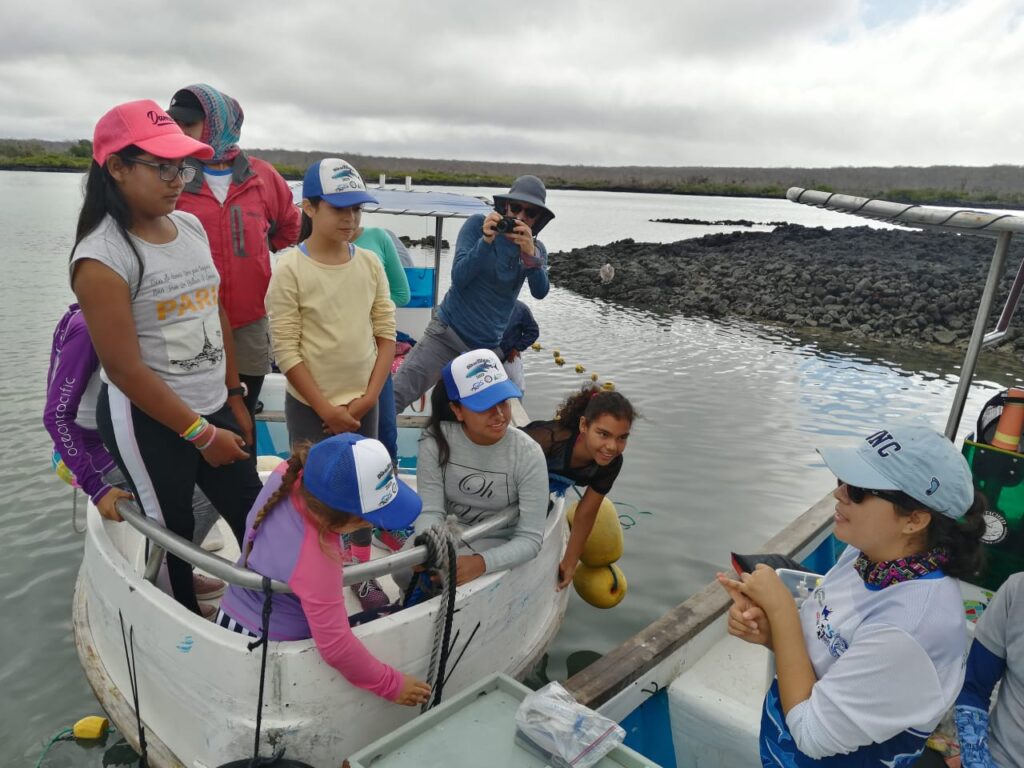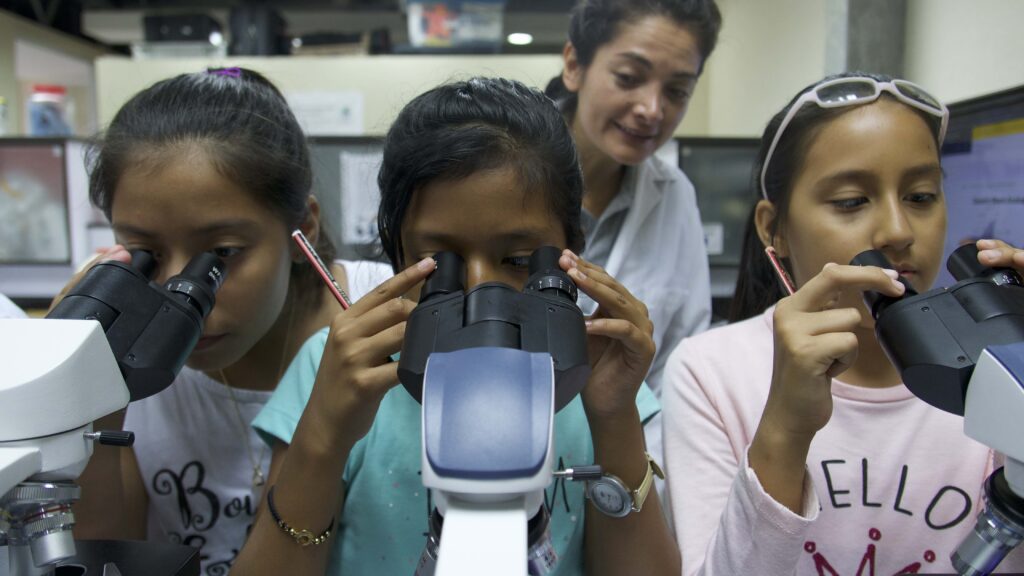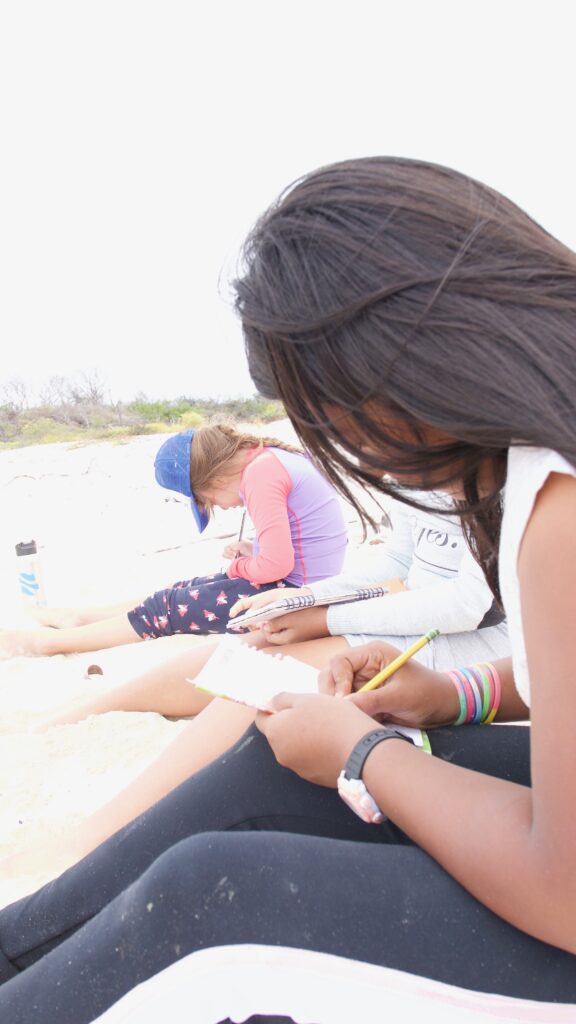International Womenʼs Day is an opportunity to celebrate the social, professional, and cultural achievements of women all over the world. The Galapagos Initiative is home to incredible female leaders and scientists at UNC, USFQ, and at the Galapagos Science Center. For International Womenʼs Day this year, we will showcase seven of these accomplished women throughout the week.

Today, we sit down with Diana Pazmiño, native Galapagueña and shark and ray biologist at Universidad de San Francisco Quito (USFQ).
What drew you to shark and ray research?
I grew up in the Galapagos and have been snorkeling since I can remember. There is a place close to the pier on Isabela island where there were lots of reef white tip sharks that we used to swim with. When I was little, my dad took me under the water to see them. I was scared, so I started asking a lot of questions about them. My dad started reading about them to answer my questions, so we learned a lot about them together.
As I grew up, I began to notice a difference in the number of rays and sharks in the bay, and the population decline got my attention. I started doing my own research about what was happening to sharks and rays in global terms, and I thought, okay, I want to do something about it.
How has working with the Galapagos Initiative been challenging for you?
Genetics is a challenging area to work in because it is constantly changing. Living on an island, there is an obvious level of isolation that makes it difficult to keep up with new findings. The university has been very supportive of every staff member to go out and keep learning, training yourself, and collaborating with scientists all over the world.
Then there is the challenge of being a female scientist in a sexist society. Shark research is often seen as a job for males only because people think sharks are dangerous, but thatʼs not true. There are so many talented and successful female shark researchers. There is no restriction on what you can do based on gender.
What are you most proud of?

I am extremely proud of my students, and the girls in the Gills Club (Chicas con agallas). The Gills Club is an education initiative started at the Atlantic White Shark Conservancy to connect girls with female scientists from around the world and inspire a new generation of ocean advocates. We opened a chapter in the Galapagos because we do face gender bias that limits what girls think they can do. At first, it was hard for people to understand the Gills club because they did not understand why we need to create spaces just for girls in order to close the gender gap. The idea is to put girls in touch with female researchers and provide them with a mentor and role model. We educate them about conservation, management, and marine ecology. We teach them everything from the anatomy of a shark to how to take samples and conduct research. We even invite other female researchers to come give talks. We want them to know that the field of science is open to them and full of opportunities.
The pilot program includes 12 girls, most of them 8-12 years old, but it has not closed yet due to the pandemic. We have received so much support from local institutions and businesses who donate what they can. The girls love the club, and it is so rewarding to see the girls picking up plastic everywhere all the time because they know it could hurt a shark, ray, or turtle. One of our youngest Gills Club members even asked for a microscope for Christmas this year which made me happy!
In the face of adversity, what allows you to forge ahead?
The science career path is not an easy one. I try to remind myself that I am capable of anything and to surround myself with people who believe in and support me while being there for others as well.

I am part of a program called Homeward Bound, which is leadership training for women in STEM around the world. We provide each other with support through ideas, stories, and information. The programʼs goal is to train 1000 women in STEM in leadership and career skills. It has been life-changing for me to make connections with women engineers, physicists, chemists, biologists, and more. You can apply no matter where you are, whether you are just starting your masterʼs degree or already hold a really high academic position.
In the Galapagos community, we have also created a program called Manos Reciclando (Recycling hands) to support local women. We created a workshop, a place for women to go and make crafts from recyclable materials. They turn garbage into something they can sell, trash to treasure. It is less about what they are doing, but how safe they are feeling in this space. They come together and work and talk without being judged. Having a community of supportive women makes a huge difference, especially in a place where domestic violence is a thing.
What advice would you give future women in STEM?
International Womenʼs Day is a chance to celebrate the work of talented females. We can learn from and be inspired by each other. We must remember it is not about having women in leadership roles only, it is about having women in decision making roles too.
You need to keep reminding yourself that you can do this. There are a lot of people who will tell you that you cannot and try to convince you that you do not belong. Imposter syndrome is real, but knowing its name is empowering.
A career in science requires a lot of motivation, and it can be challenging and even disappointing at times. It is important to know that we are not alone, and there are a lot of people that need support and are willing to support each other. Keep your life balance and remember that not everything is about work. It is important to keep a life balance and good mental health, and, to remember that you belong here.
Written collaboratively by Kelly Weaver, Director of External Affairs & Communications, Center for Galapagos Studies; and Molly Herring ’23, UNC Global Studies and Biology.

